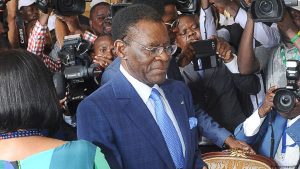Umamah Bakharia | ub@radioislam.co.za
2 min read
22 November 2022 | 11:00 CAT
Preliminary election results released by Equatorial Guinea’s government show the ruling party winning over 99% of votes counted in presidential, legislative, and municipal elections held on 20 November.
The Central African country is run by the world’s longest-ruling head of state, 80-year-old President Teodoro Obiang, who seeks to extend his 43 years in office.

Photo credit: DW
Speaking to Radio Islam International, Dr Fru Norbert Suh, Lecturer in the Department Of Political Science & Comparative Politics at the University Of Buea, Cameroon, says Equitorial Guineas has been illustrated negatively light by Western media outlets, which is not the case.
“Although multi-parties were introduced after 1990, several measures have been taken to open up the political landscape, but this was not without attempts to restrict people’s rights to participate and to expression,” says Dr Suh.
In 2016, efforts were made by the government to restrict internet access with just the presidential website operating.
“It is neither an authoritarian nor dictatorship, maybe playing between a democracy and a authoritarian regime,” says Dr Suh.
Since independence from Spain in 1968, Equatorial Guinea has had only two presidents since independence: Obiang and his uncle Francisco Macias Nguema, who he removed in a coup in 1979.
However, in this election, two opposition candidates stand against Obiang, who seeks a sixth term as the president.
The candidates are Buenaventura Monsuy Asumu, who has run in the previous five elections, and Andrés Esono Ondo, who is running for the first time.
Early estimated results showed Obiang’s ruling Democratic Party of Equatorial Guinea (PDGE), and coalition with 67,012 votes out of 67,196 counted so far.
Listen to the full interview with Dr Fru Norbert Suh here:







0 Comments